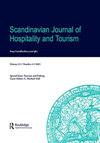Creating shared collaborative tourism identity in a post-communist environment
IF 3.1
4区 管理学
Q2 HOSPITALITY, LEISURE, SPORT & TOURISM
Scandinavian Journal of Hospitality and Tourism
Pub Date : 2021-03-02
DOI:10.1080/15022250.2021.1893214
引用次数: 5
Abstract
ABSTRACT Collaboration is important for fostering tourism in a region and the creation of a shared collaborative identity facilitates this process. This paper explains the role of individual identities in the process of creating a shared tourism collaborative identity in a post-communist environment. To this end, it uses multi-grounded theory to analyse 37 individual interviews and 1 focus group interview conducted in 2 tourist destinations in Estonia. In the constantly evolving post-communist tourism environment, collaborative identity creation relates to self-construction at the individual, interpersonal, and group levels. This study shows that the place, occupational, cultural, and environmental identities in a given place shape and form shared tourism collaborative identities; however, a collaborative platform is required for shared collaborative identity creation. Specifically, during the shared collaborative identity creation, stakeholders bring their own identities to the process through the platform, on which individual and collective identities interact. The platform magnifies or weakens the perceptions of the shared collaborative identity. As collaboration broadens, the platform shifts from a small group to bigger groups. Nonetheless, during this the shared tourism collaborative identity creation is vulnerable, as stakeholders may perceive threats to their individual identities.在后共产主义环境中创建共享的合作旅游身份
合作对于促进一个地区的旅游业发展非常重要,而创建一个共享的合作身份有助于这一进程。本文解释了在后共产主义环境中,个人身份在创造共享旅游合作身份的过程中所起的作用。为此,本研究运用多元理论分析在爱沙尼亚2个旅游目的地进行的37次个人访谈和1次焦点小组访谈。在不断演变的后共产主义旅游环境中,协同身份创造涉及个人、人际和群体层面的自我建构。本研究表明,地方、职业、文化和环境认同在给定的地方形成并形成共享的旅游协同认同;然而,共享协作身份创建需要协作平台。具体而言,在共享协同身份创建过程中,利益相关者通过平台将自己的身份带入过程,个人身份和集体身份在平台上相互作用。平台放大或削弱了共享协作身份的感知。随着协作范围的扩大,平台从小团体转向更大的团体。然而,在此期间,共享旅游的协作身份创建是脆弱的,因为利益相关者可能会认为他们的个人身份受到威胁。
本文章由计算机程序翻译,如有差异,请以英文原文为准。
求助全文
约1分钟内获得全文
求助全文
来源期刊
CiteScore
7.90
自引率
8.30%
发文量
14
期刊介绍:
Scandinavian Journal of Hospitality and Tourism is the leading Nordic journal for hospitality and tourism research. SJHT aims at initiating and stimulating high-impact and innovative research relevant for academics and practitioners within the hospitality and tourism industries. The journal takes an interdisciplinary approach including, but not limited to geography, psychology, sociology, history, anthropology, and economics. SJHT encourages research based on a variety of methods, including both qualitative and quantitative approaches. The journal covers all types of articles relevant to the Nordic region, as well as the North Atlantic, North Sea and Baltic regions. We also welcome reviews and conceptual articles with a broader geographical scope that clearly enhance the theoretical development of the hospitality and tourism field. In addition to research articles, we welcome research notes and book reviews. Published articles are the result of anonymous reviews by at least two referees chosen by the editors for their specialist knowledge.

 求助内容:
求助内容: 应助结果提醒方式:
应助结果提醒方式:


